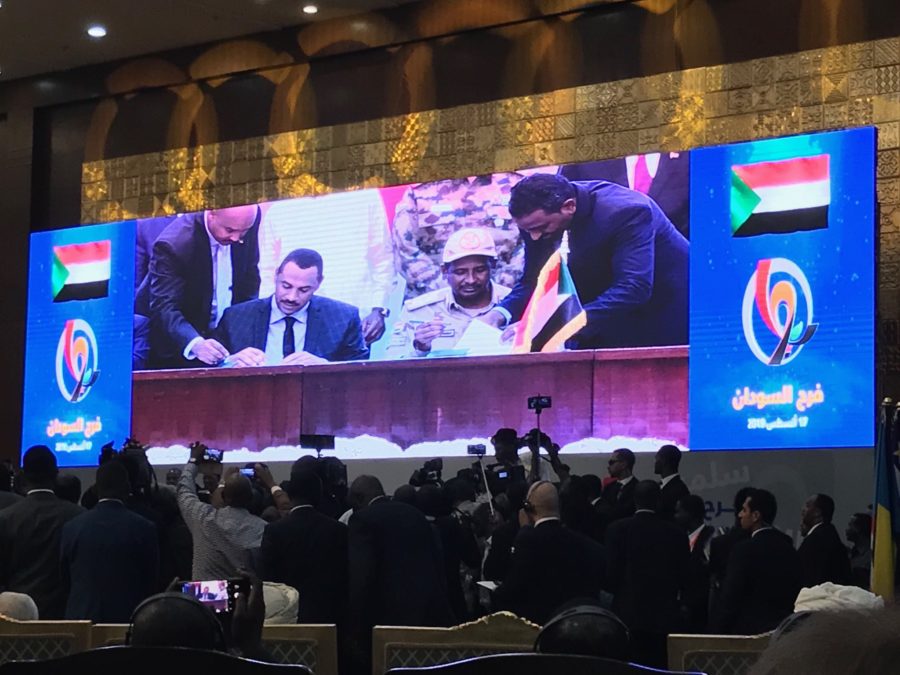Protestors took to the streets of Sudan in December 2018 calling passionately for change. Their persistence led in April 2019 to the removal of former President Bashir. But what followed was not civilian rule but a tense period of political negotiations and sometimes confrontation with the Transitional Military Council that assumed power. This period saw many ups and downs, with the massacre of so many innocent protestors on 3 June the worst point.
But the vision and commitment of the Sudanese to building a new Sudan, civilian-led and based on the revolutionary slogan of “freedom, peace and justice” never wavered. Last month we eventually saw the conclusion of the transitional political agreement, the formation of a civilian majority Sovereign Council and the appointment of a civilian Prime Minister. These are momentous achievements. They will define the coming period in Sudan.
The 17th August ceremony bringing the agreement into force was a historic moment. It was also a deeply emotional event. An opportunity for all those who had put their lives on the line to celebrate their achievement and to mourn those who lost their lives in the struggle. A time to reflect on the damage that had been done to the state and society over the last 30 years and to cherish the opportunity to rebuild Sudan in a new image. One that is inclusive and just, valuing all Sudanese as equal citizens, celebrating their differences. It was a privilege to be present at the event to witness, I hope, the birth of a new Sudan. One that reflects the energy, intelligence, compassion and humour of the Sudanese people. It was a moment of optimism, hope and pride.
With civilians now at the helm, in a power-sharing deal with the military, hopes and expectations of change are growing. This is itself one of the major challenges that the new civilian leaders will face. Having waited so long for civilians to be in charge of the transition, the long-suffering Sudanese people will be impatient to see improvements in their lives.
“But the challenges facing Sudan are huge. Unresolved conflicts; economic instability; corruption; poor governance; human rights challenges; widespread poverty; humanitarian crises and to top it off, the recent floods. Managing expectations of this government will be difficult. Solutions won’t come quickly. The government will need time and patience from the people.”
The good news is that the revolution should inspire a shift in the international community’s position towards Sudan. For too many years Sudan has been penalised for its destructive policies. But with a new civilian led government it will be in a strong position to press for a change in the international approach to Sudan. The UK is committed to working with our partners to make that change a reality. We will offer political support and economic and technical assistance to make the reforms needed in Sudan a reality. We will also advocate strongly with our international partners to do the same. But there are legal and technical obstacles, including Sudan’s debt arrears and the US designation of Sudan as a State Sponsor of Terrorism, that will need addressing before any major packages of financial assistance will be possible. The Sudanese people need to understand this and prepare themselves.
To create the best conditions for assistance, the new Government should take quick steps to convince those in the international community who are sceptical of the change in Sudan. The first is to bring peace to the country. This has already been identified as the top priority of the transition. The conflicts not only cause huge suffering, but they distort the economy and divert resources to the military that should be spent on health and education. That is why the UK and our partners will do all we can to support peace efforts in Sudan. The Armed Movements have a huge responsibility to engage with the new government to make peace a reality. Although the transitional political agreement and constitutional document may not be perfect, there is no argument for rejecting them. The international community will not support actors who do not grasp the golden opportunity we now have to secure peace. All sides need to engage in good faith with a commitment to achieve peace. Those who act as spoilers will be held responsible.
The other step the new government can take is to change some simple laws and policies that can help cement the culture of openness and inclusion that we witnessed at the sit-in. Freeing the media of all restrictions. Doing the same to those wanting to provide humanitarian assistance to the most needy. And promoting human rights for all. These may not seem like top priorities given Sudan’s economic crisis. But convincing the rest of the world that Sudan deserves assistance will be easier if the face Sudan shows to the world is more open and attractive.
It’s an exciting time to be in Sudan. I am optimistic that if we work together, we can help deliver the change that drove the revolution. We can improve lives in Sudan. And we can continue to inspire people around the world about the change that people power can bring.

